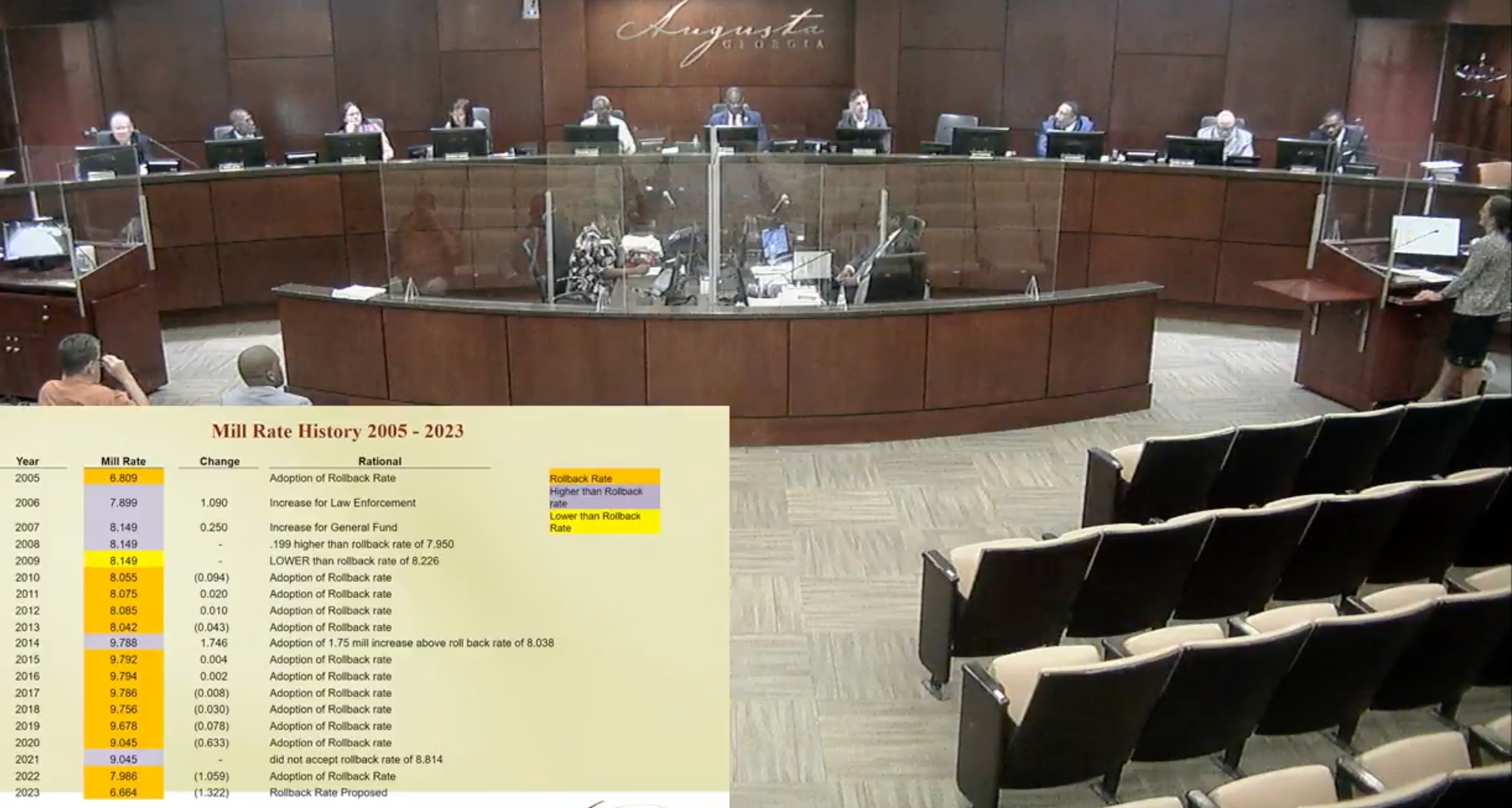The Augusta Commission voted to approve proposed roll-back property tax rates Tuesday. Coupled with a onetime state tax credit, the lower rates give a break to many homeowners facing skyrocketing revaluations.
The proposed countywide rate of 6.664 mills is a reduction from the 2022 rate of 7.986. Homeowners in the old city limits will see their additional assessment drop from 4.307 mills to 3.642 mills.
The mill rate or millage is applied to a property’s taxable value to determine the amount the owner must pay in property taxes when bills go out next month. For example, a property valued at $100,000, which has a taxable value of $40,000, faces a bill of 40 times the mill rate for city taxes. School taxes and solid waste fees add more.
Homeowners already receiving a homestead exemption, which knocks $5,000 off the taxable value, will see another $18,000 taken off under the state tax credit, Finance Director Donna Williams said.
The commission approved the rates after seeing them for the first time Tuesday. Despite the decrease, the rates will raise an additional $2 million for the government to spend.
The approval was the 13th time in 19 years the commission has adopted the “rollback rate” rather than a higher or lower tax rate, according to a chart. The commission voted for a millage rate increase in 2006, 2007, 2014 and 2021, and a rate lower than the rollback rate in 2009, it said.
In any event, property owners who have till Aug. 21 to appeal their reassessments – which determines the value of their property being taxed – and nearly 600 have filed appeals so far, Chief Appraiser Scott Rountree said.
Commissioner Wayne Guilfoyle said he’d actually helped some elderly constituents fill out the appeal forms after the increases appeared to make little sense.
One homeowner on McDade Farm Road, for instance, saw his valuation increase from $112,000 to $160,000 this year. Where are homes in the area selling for that amount, Guilfoyle asked.
Guilfoyle said a property he owns jumped from $101,000 to $172,000 this year.
Rountree said Augusta uses comparable sales – and when no nearby comparable sales exist, it looks as far as several miles out for them.
“If there are not enough sales compared to a subject parcel, we’ll start stretching out a little bit further till we find them,” he said.
Augusta has about 600 neighborhoods now lumped into 80-90 groups for comparison, he said.
Questioned by Guilfoyle, Rountree said the board of assessors had not authorized a countywide revaluation since 2009.
Each of Augusta’s 10 board of assessors members collects $625 a month to attend meetings.
While Richmond County Board of Education is also setting tax rates and property values are assigned by the assessors board and taxed by the tax commissioner, it’s the city that will take the heat for any tax increase, Commissioner Alvin Mason said.
School taxes, from which most individuals age 65 or older are exempt, make up more than half of a typical Augusta tax bill.
“It’s not going to be the tax assessor. It’s not going to be the tax commissioner. It’s not going to be the school board, even though they have way more invested in the situation. It’s going to be us,” Mason said.
In other action
In other action Tuesday, the commission voted to accept the resignation of Patrick Clayton, chief deputy for the Richmond County Sheriff’s Office, effective Dec. 31.
His resignation and classification as a senior executive staff member under city personnel policy gains Clayton an automatic six months’ severance pay and benefits package.
They heard from local arborist Roy Simkins Jr. about the ongoing mass removal of old trees for a downtown streetscape project. “Our urban forest is in great jeopardy right now,” Simkins said.
Opioids are the No. 1 cause of death for Augusta adults ages 30-50, Lee Merchen, district health director for the East Central Health District, told the commission.
Class-action lawsuits Augusta has joined will garner the city around $580,000 per year for nine years and approximately $212,000 for 18 years from opioid distributors, while additional settlements with Purdue Pharma and other manufacturers are pending, according to a presentation Merchen gave at the meeting.











